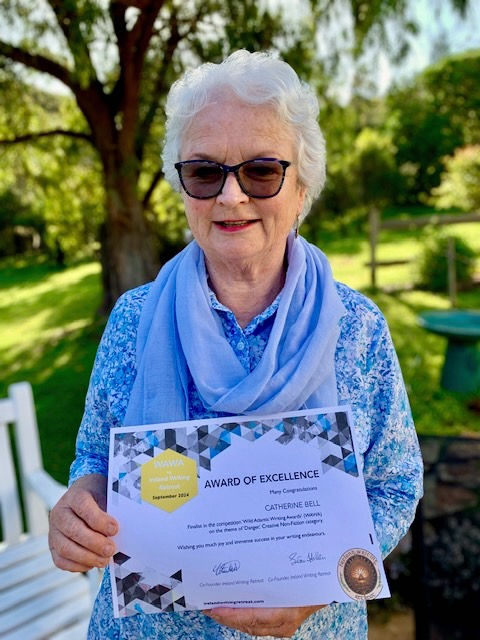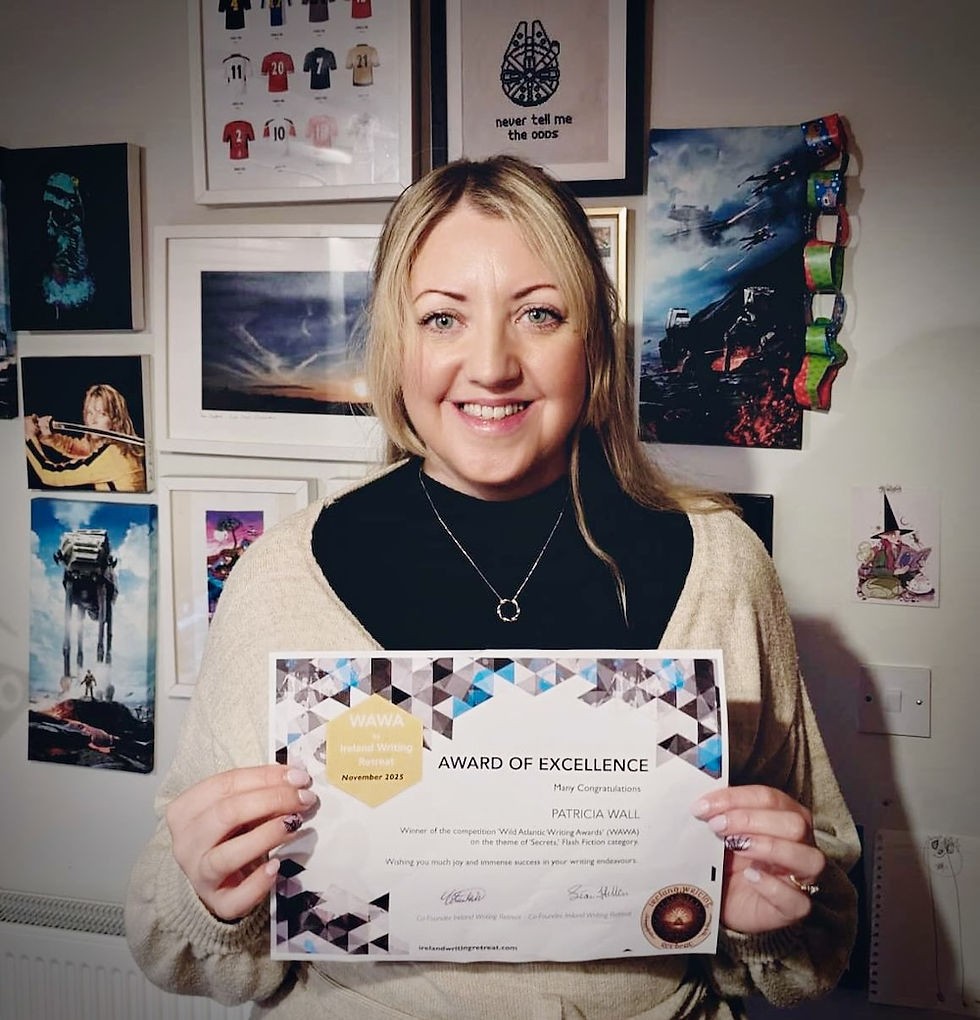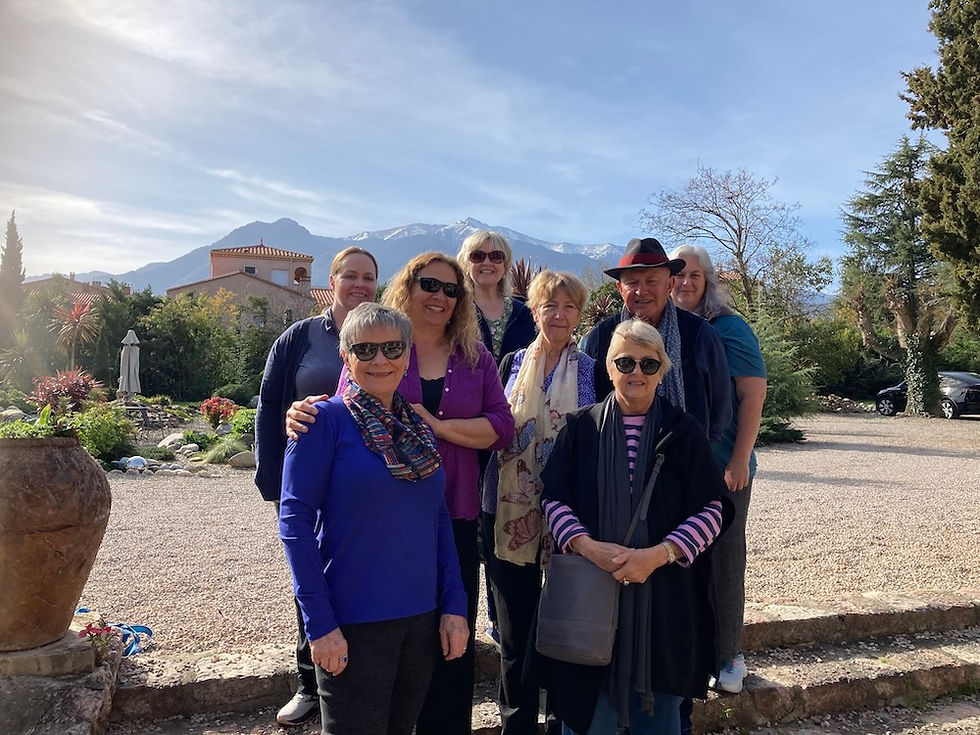Where Do You Get Your Ideas From?
- columbiahillen

- Nov 19, 2024
- 10 min read
It’s one of the questions we ask finalists of our Wild Atlantic Writing Awards (WAWA). Ida Linehan Young bravely brings back a painful childhood memory; Catherine Bell relives the moments her plane almost crashed; and Kieran Marsh is inspired by art to bring us in his world of a flash fiction story.
But why not let them speak for themselves and prepare to be inspired.
Especially as a new competition on the theme of 'Endings' is now opened and we are looking forward to receiving your stories.

Speaking of endings, as we are approaching the end of the year, our Early Bird offer for the 2025 writing retreats has a deadline on December 31st, so make sure you check it out before it's too late.
Ida Linehan Young, 60, is a finalist in the creative non fiction category of ‘WAWA Danger’ competition with her story ‘Why choose me?’
Q: What were your feelings upon hearing you are a winner in the competition?
A: This competition was special because I am 100% Irish according to my DNA so writing to a home away from home competition seemed fitting, being one of the finalists seemed fated. I have written in Ireland, but not for Ireland. I'm honoured.
Q: Please tell us a little about yourself.
A: I’m a wife, mother, and grandmother living on the majestically beautiful island of Newfoundland in province of Newfoundland and Labrador, Canada. I’m fiercely proud to have been born and raised a Newfoundlander.
I have fulfilled a life-long dream to write, beginning with my memoir, ‘No Turning Back: Surviving the Linehan Family Tragedy,’ which was published days before my 50th birthday in 2014. Since then, I completed six novels and a work of non-fiction that made it to the Canadian Best Seller list.Influenced by my love of local history and the familial art of storytelling passed down by my father, Edward Linehan, and my maternal grandfather, Frank Power, I write stories that tell of my people and my roots. I enjoy researching the past of my beloved birthplace and writing historical fiction which complements its richness and sparks interest in the storied past of my province.
Q: Do you have another job beside being a writer?
A: I’m a manager of Information Technology Systems in the Canadian Federal Government (28 years), I write as a hobby and because I love it.
Q: How did you learn about our writing competition and what made you enter it?
A: I follow the page on social media and was connected to it from a writing retreat in Clifden in 2023. I love the challenge a contest brings. I find it makes me think and write to a higher calibre with each entry. When I saw the topic, I knew right away that I’d enter.
Q: How did the idea for your story emerge?
A: I related to the subject of Danger and challenged myself to write it. I wrote this fairly quickly over two days with no revisions. It just kind of flowed and I was happy with the first iteration. The most difficult challenge was ensuring what I want to say was said. Although most writing can be interpreted in different ways, I still like my story to be crisp and worthy of reading and fitting to the topic.
Q: Did you have several titles for your story before you decided on the final one - what were the others?
A: This story was so personal and I always wondered why I was chosen to live among other things. So, the title was just there on the page waiting for me to write the story underneath it. Thank you for offering such a prestigious contest that allows writers like me to submit a written offering across the water to my ancestral homeland. Much appreciated.
Why Choose Me?
by Ida Linehan Young
My memory is etched in the unforgettable, the kind of etching constantly in focus. It’s physical. I absently graze my scars.
My mother’s hoarse voice shouting, “Get up! The house is afire.”
Her words float on the smoky air muddling my fifteen-year-old mind. A sucking gasp made me cough. I leapt from the bed in the pre-dawn heat attributed to a smouldering beast somewhere beneath.
I plucked my unresponsive sister from under the covers and stood her beside the bed while I looked for a way out. Anxious, only that my mother would be mad, I struck the windowpane with a cross-country trophy and cleared the cardboard bookshelf with my bare feet. A hollow boom, triggered by this fertile air, shook the floor.
As I arched upward into the morning, I fought the impulse to keep going. But I couldn’t leave my sister. That saved me from flames that licked and lifted the felt along the porch roof rim beneath the window. Tar invaded my nostrils. This was not salvation but betrayal of the notion it was the alternate way out.
As black smoke pummelled me for escape, I retreated to the closet and squat, hugging my knees. The roar of fire gorging on air and wood pulsed in my ears. I supped the heat and became giddy. I would die here.
Instinct is a powerful friend. It pushed me out of temporary safety and into the murky bedroom. I grabbed my sister and dragged her into the hall. Flames blocked the stairway and devoured the walls. Strangling smoke blurred my vision as the heat intensified. I gripped the stair rail as we edged toward an escape at the front of the two-storeyed inferno. My fingers burned.
Someone struck me and knocked me to the floor. I lost my sister’s hand and frantically groped to find it. Without success I believed she’d gone with whichever sibling passed me going the opposite way. My mind began a chant, “if you panic, you will die.” I concentrated on those revolving words as I righted myself and continued along the hall.
My shoulder shrivelled beneath the batting flaming hands. The rail guided me to my brothers’ room. If you panic, you will die.
Light from the window beckoned. I smashed the glass with my fist. It didn’t shatter, merely fell away, happy enough to escape. Flames ravaged my face and drove me back. I turned to the door. Paint bubbles formed in the lead paint on the casing.
Trapped.
If you panic, you will die. I plunged forward, passed through the vortex of flames, into the room across the hall. I collapsed and drove my body toward the window. I landed with a jolt on rocks twenty feet below. A shower of glass and sparks followed me.
Forty years later, happy images of Francis, Richard, Sharon, Harold, and Barry compete with those cruel etchings. I rub my scars and grimace at the graves. Questions remain. Atop them. Why choose me?
Catherine Bell is a finalist in the creative non fiction category of ‘WAWA Danger’ competition with her story ‘Taste of fear.’
Q: What were your feelings upon hearing you are a winner in the competition?
A: I am thrilled to be a finalist. I’m a relative newcomer to writing, and it’s the first time I’ve entered an international competition. It’s great encouragement to keep writing.
Q: Please tell us a little about yourself.
A: I’m in my early 70s and live in a small coastal village near Melbourne, Australia. I have worked in the education sector over many decades as a classroom teacher, an education consultant and as an education researcher at The University of Melbourne.
Upon retirement, I discovered a love for writing. I enjoy writing memoirs, short stories and creative non-fiction. My stories have been published in seven anthologies and several stories have featured on Australian radio programmes.
Q: How did you learn about our writing competition and what made you enter it?
A: I came across WAWA competition and your writing retreats on the internet. I was looking for opportunities to combine two of my passions, writing and travel. The WAWA competition provided a challenge and a purpose for my writing.
Q: How did the idea for your story emerge?
A: I was on a flight from Australia to London a few years ago when the brakes on the A380 failed upon approach to Dubai airport. It was a frightening experience, one not easy to forget.
Once I have an idea for a story, I explore all the possible angles making sure there’s enough ‘meat’ for the story. It may take a few days or a week to gather the thoughts in my mind. Walking the dogs usually helps with part of the process. Then I write quickly, almost like a stream of consciousness, as the words tumble down onto the page. I edit my work more slowly.
The most difficult challenge was to maintain the momentum of the story to mimic the A380 approaching the runway without brakes. I used short sharp sentences or incomplete sentences, to move the story along quickly.
I employed the ‘explode the moment’ technique in writing this short piece. Paradoxically, this technique tells the story in slow motion, freezes each frame, and loads it with minute and sensory details.
Q: Did you have several titles for your story before you decided on the final one - what were the others?
A: No, ‘The Taste of Fear’ was the original title. I like to use a title that piques the reader’s interest without giving away too much of the plot.
Taste of Fear
by Catherine Bell
I lunge forward. Arms crossed. Head pressed hard against the seat in front.
‘Brace, brace, brace. Emergency … brakes … malfunctioning.’
Heart pounding. Struggling to breathe. Panicking. Powerless. Paralysed.
The captain again. ‘Longest runway has been cleared for landing.’
Oxygen masks cascade through the cabin like party streamers. The man next to me clasps his hands in silent prayer. A woman wraps her arms around a young child. A kaleidoscope of familiar faces flashes through my desperate mind. I question my need to travel, my need to leave home.
Turning towards the window now. Skimming low over sand dunes. Snaking, dry riverbeds. Oases of green. Close range like a rapid-fire slideshow. Thin plumes of dust rise from criss-crossing roads. A vast grid of flat roofs emerges through the heat haze. Silver silos, the skyscrapers of Dubai, shimmer on the near horizon.
The burning sun, the burning desert, burning my pale skin from the inside out.
Travelling too fast for a normal landing. No slowing down. No sensations of dropping gently through clouds. No margin for error.
The runway quickly comes into view. A baby cries. I close my eyes. Tasting fear. Cold and metallic. Piercing squeals. Thunderous roaring fills my shrinking world.
We hit the tarmac. Jarring on impact. My head slams into the seat in front. The plane shudders and groans in protest. Thump, thump, thumping. Holding true direction for an eternity. The A380 closes in on the end of the runway. Engines cut. We glide to a halt.
Complete silence.
A woman begins sobbing in the row behind. Hushed voices. Uncertain clapping rising and falling, then rising again to a crescendo. Relief spreads through the cabin.
I gasp for air. I think of home, my heart, my anchor.
Kieran Marsh is a finalist in the flash fiction category of ‘WAWA Danger’ competition with his story ‘The drop.’
Q: What were your feelings upon hearing you are a winner in the competition?
A: Delighted, always wonderful to receive a plaudit for your creativity. I made sure to go out and celebrate.
Q: Please tell us a little about yourself.
A: I am from Dublin, I work in IT Management and have been writing for over fifteen years. I have had a few short stories published here and there but my passion is for novels. I was attracted by the Wild Atlantic Way in your competition title, I spend a lot of time in Mayo and find it inspiring.
Q: How did the idea for your story emerge?
A: The Wild Atlantic Way (WAW) art piece in Killala harbour, between County Mayo and County Sligo, was a strong visual inspiration for me. I pulled in a character from my novel-in-progress.
It was about a 2-3 week preparation time, short by my standards. I would have read/revised it at least once every day in that time period.
The most difficult challenge in writing my story was the length. I’m used to having more space to develop character.
Q: Did you have several titles for your story before you decided on the final one - what were the others?
A: Not really, sorry. It was a good experience, I learned something more about one of my characters, and to get to the final was thrilling.
The Drop
by Kieran Marsh
There was a weird yoke in the car park. Some kinda rusted metal pole, bent in the middle, a zig-zag on the end, the letters of “Killala Quay” stood out.
- Poxy art shite, he said to nobody, and spat at the pole.
A car pulled in behind him, scattering gravel. Black Audi Q5 Sportback. He took a last drag and flicked his butt out into the water.
- How’r’yeh, he said as he pulled himself into the passenger seat.
- Respect, Eamo.
- Respect, Pluto.
Peter “Pluto” Shortall kept himself well. Head and face close shaved, clean white teeshirt stretched over formidable muscles. He was short, but there weren’t many could stand up to him in a straight fight, and he never fought straight. He could have been any age between twenty and sixty. He might be immortal.
- Yeh keeping the head low?
- Yeah. Bleeding bored off me tits and all.
- Better bored than dead.
- Pigs still looking for me?
- Wouldn’t be worrying about them pigs, they couldn’t catch the clap from a hooer’s fanny. Them Salley Hedges boys are out for yeh, but.
- Yeah.
He watched a bunch of ducks landing on the water just out from the quay. His girlfriend Annie would love it here, she was into all this nature shite. All he could see, though, was poxy water and poxy dunes and poxy boats.
- Way I’m seeing it, Eamo, it’s that wan Maggie yeh have to worry about. She’s the one won’t let the Salley Hedges boys leave off, like.
- The fucking ould dragon.
-Yeh know what they say about dragons, though. Yeh cut the head off.
- Is that what they say?
- Bleeding is.
There was a poke on his leg. He looked down. Pluto had pulled something wrapped in a plastic bag from under the seat. He was pushing it on Eamo.
- Ah, Jaysus, no, Pluto, no.
- Yeh’re not gonna be able to hide out here forever.
- I can’t do that, Pluto. It’s not me, like, yeh know. And a woman, and all. I couldn’t bleeding do it.
- Yeh’re a Shortall, Eamo. Yeh’ll bleeding do what yeh have to.
There was a moment, an eternal moment. It could have gone either way. He saw the rage in Pluto’s black eyes. He saw the fury in the taut muscles of his arm. The message was clear. You’ll take the gun, one way or the other. You’ll get one end, or the other.
He grabbed it, shoved it up his jumper.
- Good man, I’ll send Billyer for yeh when we’re ready. Keep yer burner phone charged, but.
Pluto reached over, pulled him awkwardly into a manly hug.
- Respect, Eamo.
- Respect, Pluto.
Eamo got out. Pluto drove off, tyres screaming around the corner. Eamo was mad for some curry chips and a pint, but he’d have to drop the piece home to his airbnb.
- Poxy art shite, he said again, spitting.


















Comments